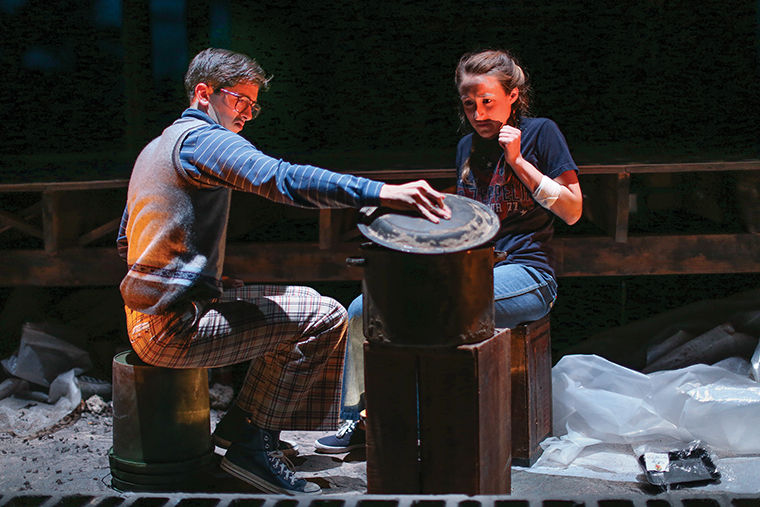Shakespeare-esque horror-comedy mix debuts on Goodman stage
Olivia Cygan, who plays the lead Chris and Jordan Brodess who plays Hugo, play two teenage neighbors in “Feathers and Teeth.”
October 5, 2015
There is no telling what is beneath the surface of a smile—there could be feathers or there could be teeth.
That is the premise of horror-comedy play “Feathers and Teeth” which opened Sept. 19 at the Goodman Theatre, 170 N. Dearborn St., and is scheduled to run until Oct. 18. The play is directed by Northwestern theater professor Henry Godinez and written by playwright Charise Castro Smith.
During a public talk with Godinez and Castro Smith held by the Goodman on Sept. 27, the two discussed the show with playwright Brett Neveu. Castro Smith, trained as a classical actress, said the play was inspired by Shakespeare’s classical characters and themes, comparing it to the role women play today.
“I started to get frustrated that a lot of big [Shakespeare] roles were men,” Castro Smith said.
She decided to challenge herself and write a play with a strong female lead that incorporated her love for ‘70s horror films. Castro Smith also wanted to highlight the experience of grief and how different people handle it. These elements, combined with a mirroring of Shakespeare’s “Hamlet,” create a “bizarre mash up” of a horror-comedy play, she said.
The show focuses on a family’s loss of a wife and mother. Castro Smith described 13-year-old Chris as an active heroine lead. She is not happy when her father’s new wife moves in, so she tries to get rid of her. The show then takes a supernatural path, and Chris builds on Hamlet’s conflict of sanity versus insanity. Castro Smith said she wanted to explore the duplicity of both sides, which explains the reference to “Feathers and Teeth.”
“Monsters turn up in what happens when you ignore these huge, unignorable feelings,” Castro Smith said, referring to grief. “In the end, grief is not something anybody can actually control. It is this force.”
Godinez, who is also the resident artistic associate at the Goodman, said he wanted to create this play to highlight female characters and the way women are often perceived in today’s culture. Like Castro Smith, he wanted this work to reflect a strong female lead.
“My daughter was sensitive to the way young women are represented [in our culture],” said Godinez, who was raised by women and has only daughters.
Jordan Brodess, who plays Hugo the neighbor in the show, said this is his first official production with the Goodman. Brodess said his character is wild, wacky and funny.
“[He] is grounded in the reality of the show,” Brodess said, adding Hugo is one of the only real human beings who stays true within the parameter of the show.
Castro Smith said by the end of play, not many characters are likable, and no one would want to be their friends, aside from Hugo.
“You could go out and have an ice cream with Hugo,” she said.
Brodess said Castro Smith did such a great job of writing the play and developing its dialogue that he did not think of the play as categorically horror-comedy.
“It’s not necessarily a comedy or a horror,” he said. “It’s their world. That’s what helps push [it] along.”
Brodess said he is happy to be part of the creation for the first time and learned how to put new work together and watch it unfold collectively as a group.
“Each [play] is sort of its own animal,” Brodess said.
Godinez said since it is a debut, there was a lot of work to piece together.
“There is no road map to the play,” he said. “[But] the ultimate goal is to serve the playwright’s vision [and] engage [the] audience’s response,” Godinez said.
He also said it is interesting to watch the relationships between different characters and how they mirror each other.
“They kind of turn to the women in the play to lead and take charge,” he said. “Not in any sort of overly aggressive way, but I think those characters are so well-developed [that they] drive the play.”
Castro Smith made the 2015 Kilroys list, a list of plays written by female playwrights working to end the underrepresentation of women in today’s society. She said she is excited to have been include along with several Chicago playwrights and producers.
Castro Smith said she has written strong female characters in her past work and will continue to bring the gender conversation into the picture through her work.
“I’m trying to really push different stories into a cultural narrative [and do] whatever I can to make people think differently.”








